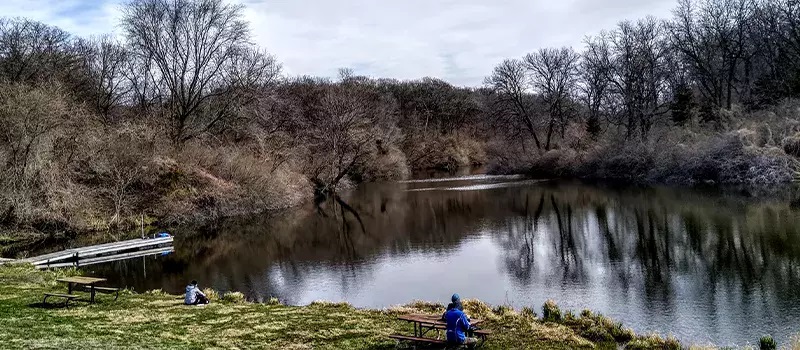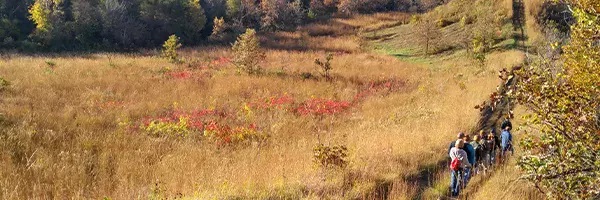The Naturalist School: Ecopoetics of justice for people and planet

“The water we drink, like the air we breathe, is not part of our body but is our body. What we do to one — to the body, to the water — we do to the other.”
In just two sentences, renowned poet, Natalie Diaz, rewrites the narrative of care for the collective — the nurturing of ourselves and all of creation. Instead, from humans to the most infinitesimal of microorganisms, we are all inhabitants of one being.
Such narrative is alive and thriving within The Naturalist School, an organization missioned to bring “people of all walks to a deeper intimacy with the natural world through a consilience of creativity and ecology.” The school’s programming goes beyond prescribed therapies like forest bathing and other outdoor activities. “Rather, as we grow in intimacy with wild communities, we walk, breathe, create and pray in nature as nature.”
One such offering is Earth-house, a TNS series of outdoor workshops deep-seeded in spiritual awareness and the ecopoetics of indigenous, Black and women writers. These literary linguists of the natural world include Natalie, Mojave in heritage and member of the Gila River Indian Tribe of Arizona. The Earth-house series is, in particular, plotted “to help our friends from diverse communities to grow in intimacy with the other-than-human presences that nurture and share our planet and to deeply connect with the generative energy and fabric of the cosmos though our own creativity.”
Emerging in 2004 from the woods of New Hampshire, TNS is facilitated by Jack Phillips, a nature writer, poet, naturalist and registered arboricultural consultant who serves as the “principal” of the organization. He facilitates Earth-house and other programming, and his “classrooms” are the woodlands, prairies and floodplains of western Iowa and eastern Nebraska.
Together, with Earth-house participants, “we read and write poetry, make ephemeral art, contemplatively and wildly walk, keep vigil by troubled waters and dragonfly broods.”
Through partnerships with nature centers and nonprofits and investments by many supporters and organizations, including the Franciscan Sisters of Perpetual Adoration, TNS now has the opportunity to broaden its breadth of programming that features ecopoetry of women, marginalized communities and diverse geographies and cultures.
Outside the TNS ecosystem, however, grows “an interesting and troubling human paradox that contributes to the global environmental crisis and perpetuates obstacles to meaningful engagement in the work of earth justice,” says Jack. “Everyone seems to ‘love’ nature, yet this love so often increases and preserves our alienation from the natural world and permits the destruction of the wild and mysterious planet that makes human life possible. Humans of ‘developed’ and affluent societies remain apathetic in the face of overwhelming evidence that the global biosphere is collapsing. There also exists the belief that ‘technology’ will somehow save us.”
Such dichotomy is a call to integral ecology — the guiding force of nature spelled out in Pope Francis’ Laudato Si’ that recognizes our interrelatedness is complex and begs a response to the suffering in our world by integrating social, economic and environmental approaches to justice.
At the root of this spiritual crisis, says Jack, is the perception that nature “is something other and apart from human life and community.” In terms of etymology, Jack explains, the meaning of the word ecospirituality is “the sustaining and creative energy of the earth-house.”
Another perplexing disparity Jack perceives is the demarcation of earth justice and social justice. “The flourishing and vitality of every community in our earth-house requires robust and interwoven diversity. The impairment and destruction of global ecosystems often impacts marginalized communities, like those of indigenous, Black and/or female peoples, most immediately and severely. The voices of these communities express an urgency less easily ignored and offer paths to earth-intimacy — primal and clear.”
So Jack and all those at TNS, purveyors and participants alike, will continue to cultivate ecopoetics and integral justice for the one being we share with all in the cosmos. And to that end, with raw clarity, “Indigenous voices and those from the margins of societies — as well as the wild nonhuman voices that continue to sing — call us home.”
To learn more about The Naturalist School and Earth-house program, visit thenaturalistschool.org.

‘Fate and future are cradled in our hands’
Jack Phillips shares how TNS is intrinsic to his very being.
“I have been walking this primal path since childhood. My father and uncles were most at home in the woods or in a canoe, and my tender experiences instilled a deep connection with wild creatures. After an academic career that took me to Alaska’s Tongass rainforest, the Coptic monasteries of the Sahara, ancient ruins and nature preserves of the Levant, I came home to wander my native woods and rivers. The Naturalist School is the result of this homecoming.
“In the traditions of Matsuo Basho, Annie Dillard, Camille Dungy, Joy Harjo and Natalie Diaz, I have returned to the mysterious and verdant haunts of my youth and the embodiment of the cosmos in a community of creaturely bodies. I believe all humans are called to come home to the wild earth. This is an ancient beckoning that resonates deeply within if we can find the wild silences to hear
it. The first letter of the first word of the first verse of Genesis is the Hebrew letter Bet, the pictographic symbol for house. This is the earth-house into which we are born and find our future. It is our cradle, and its fate and future are cradled in our hands.”
Kathryn Sutko Twit, a TNS workshop leader, offers reflection of the sustenance she receives from within TNS.
“My experience with The Naturalist School has facilitated a more acute awareness of aliveness and a deeper sense of connection and belonging to myself and the natural world, as part of the natural world. The opportunities provided by TNS to step out of the hustle and into a different relationship with time and space with a community of beings who acknowledge and honor
their own sacredness and that of all life provides vital nourishment. Filling up with Jack, the people he gathers, poetry, conversation and quiet makes my life so much richer.”
